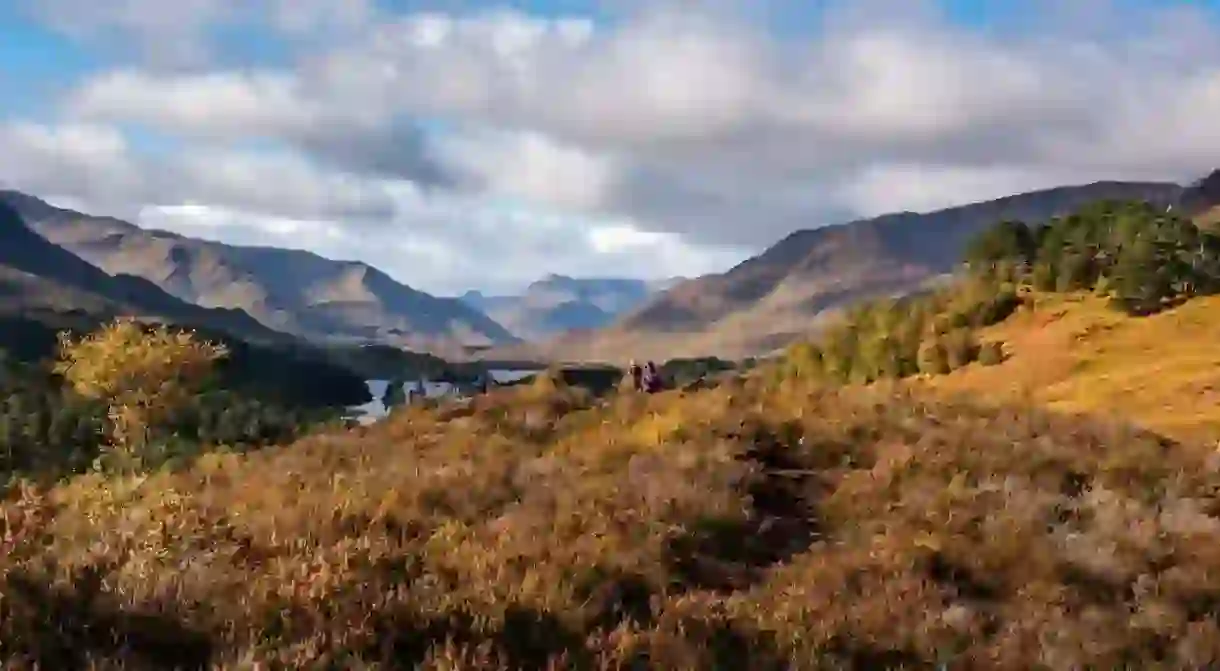Our Responsible and Off-the-Beaten-Track Itinerary to Discover Scotland’s Highlands

Get a sustainable snapshot of the Scottish Highlands with a long weekend in the cosy log cabins of Eagle Brae. Grab your canoe/pony/Tesla/hiking boots (delete as appropriate) and set out to explore remote glens, secret lochs and mysterious forests.
It’s hard not to be sustainable in this part of the Scottish Highlands. The wild landscape lends itself to conservation and responsible tourism, and business owners and visitors alike are increasingly aware of the importance of protecting their surroundings. Some parts of the Highlands, such as the North Coast 500, are becoming worryingly overcrowded – not so this pocket of woodland close to Inverness. Spend a long weekend exploring around Beauly, the Glen Affric National Nature Reserve and the Eastern Ross peninsula, and you’ll feel like you have the place to yourself.
Where to stay
For an environmentally responsible long weekend in the Scottish Highlands, the place to stay is Eagle Brae. It’s a collection of 10 beautiful handmade log cabins on a hillside between Glen Affric and Glen Strathfarrar, and just a 45-minute drive northwest of Inverness.
It has a microhydro 60kW turbine, which provides all the electricity and hot water the cabins need, so the whole set-up is carbon neutral. Each cabin also has a turf roof, which provides excellent insulation and consumes carbon, and is kept cosy with a wood-pellet stove that provides underfloor heating. As well as being as sustainable as possible, the cabins – which sleep two to six people – are damn stylish and equipped with all you could possibly need.

How to get there
This being a responsible getaway, you’re going to want to arrive in sustainable style – what could be better than a Tesla? Eagle Brae has a Tesla charging point on site, and Tesla vehicles can be hired from Ecosse EV at Edinburgh Airport. The scenic drive up through the Cairngorms is well within the car’s 360mi (580km) range.
Alternatively, the closest railway station is at Beauly – travel to Inverness from Edinburgh or Glasgow, or on the Caledonian Sleeper from London, and change trains.
Day one
The big appeal of Eagle Brae is the location – wild, remote and surrounded by some of the finest highlands in Scotland – so spend your first day exploring the local scene.
There’s nothing more sustainable than putting one foot in front of the other, or as satisfying as getting off the beaten track, so borrow an Ordnance Survey map (yes, proper old-school) from reception and set out for Lochan Fada. Why a paper map? This spot is so secluded that even Google Maps doesn’t properly recognise it, so strike out into digitally uncharted territory on an approximately 8mi (13km) round trip.

On your way, keep an eye out for wild stags, woodpeckers, woodcocks and yellowhammers, and pack a picnic (Eagle Brae can supply plenty of homemade treats). If the weather’s playing ball, this long, narrow loch is perfect for wild swimming.
Alternatively, head in the opposite direction to Plodda Falls, the tallest and most spectacular waterfall in the area – the walk through towering Douglas firs in the Glen Affric National Nature Reserve is as restorative and re-energising as it gets, and another one where you’ll want the security of a paper map.
For dinner, hunker down in your cosy log cabin and place an order through Eagle Brae’s intranet for a home-cooked meal and a bottle of wine; expect dishes featuring their own rare-breed Berkshire pigs, Hebridean four-horned sheep and wild venison.

Day two
It’s time to see the Highlands from a couple of different perspectives today. First is from the water in a two-person Canadian canoe along the River Glass from Struy. Peregrine falcons and ospreys soar overhead as you gently paddle downstream past grassy farmland flats and forest trees dipping their branches in the water, before navigating the 100ft (30m) high Aigas Gorge. You might even spot an otter or two.

Second is from the back of a pony, on a guided trek in the Glen Affric National Nature Reserve. You’ll be accompanied by the Pocock family, the only people to live in the nature reserve – they know it exceptionally well and will lead the ponies and you to some seriously remote spots. Opt for a full-day, half-day or two-hour trek. Both activities can be arranged through Eagle Brae.
For dinner, book a table at the Struy Inn, five minutes down the road. Totally unpretentious, it has just five tables (booking is essential) and sources all ingredients from the huge larder that is the Scottish Highlands. The local shellfish is particularly good, as is the range of single malt whiskies.

Day three
It’s all about local food and drink today as you head to the Easter Ross peninsula, an hour northeast of Eagle Brae. Bypassed by the NC500 as the route heads north up the A9, this coastal patch is properly remote, yet full of huge sandy beaches, ancient villages, and Tain – the oldest royal burgh in Scotland.
Grab breakfast en route at the Bad Girl Bakery in Muir of Ord, before arriving at the best-known whisky distillery in the area, Glenmorangie. Start with a tour and tasting, before moving on to the Balblair Distillery, near the shores of the Dornoch Firth.

For lunch, this close to the sea, it has to be fish and chips – ideally from the takeaway in Tain – before heading to the Seaboard villages of Hilton, Shandwick and Balintore for a bracing walk along the sandy shore. Break up the stroll by following the Seaboard Sculpture Trail along the coast, and spot mermaids, salmon and folklore tales, all cast in bronze.
For dinner, book a table at the Oystercatcher, towards the tip of the peninsula. A small place serving – you guessed it – oysters and other shellfish, it has a secluded but welcoming edge-of-the-world feel to it.

Start planning your own trip to Scotland at visitscotland.com













